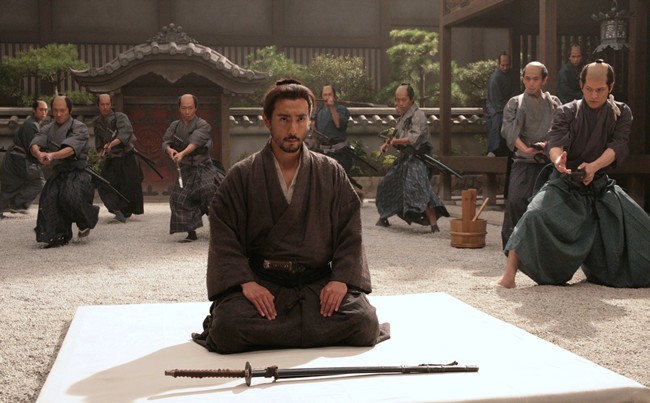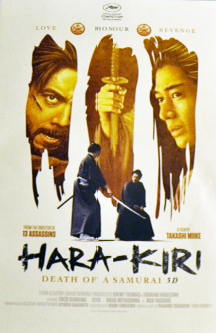
Takashi Miike is one of the most interesting and prolific filmmakers to come out of Japan, making over 80 films in nearly every genre imaginable since his directorial debut in the early 90s. His last feature film, he hugely successful 13 Assassins, had a cross over appeal that suddenly made everyone in the United States excited for his next samurai release. Unfortunately his latest venture into the samurai genre Hara-Kiri: Death of a Samurai, a loose remake of the classic 1962 Harakiri directed by the legendary Masaki Kobayashi, is a murky and static interpretation of the classic. It’s a shame considering how talented the director is, but it common place for some of his films to be utterly brilliant while others feel like they were made by a Miike knock-off.
Shot in perhaps the dullest and utterly useless 3D ever committed to celluloid, Hara-Kiri attempts to play up the tropes of the samurai era in a serious manner but ends up feeling like a melodrama spiked with a few moments of semi-interesting action. Since peaceful times have befallen ancient Tokyo, the remaining masterless ronin have had trouble adjusting. With no great battles to fight, many have resorted to committing Seppuku, the ritual suicide where a samurai slices open their stomach and then are decapitated by a fellow warrior. Hoping to find an honorable end to his poverty stricken life, samurai Hanshiro (Ebizo Ichikawa) requests an audience with one of the last remaining samurai strongholds, the House of Li. The leader of the house Kageyu (Koji Yakusho) is quick to dismiss the request because of what happened previously to the last samurai who attempted Hara-Kiri in his presence.
Kageyu tells Hanshiro a pitiful tale of a poverty stricken samurai Motome (Eija) who came to him with a similar Harakiri request but in actuality was bluffing in hopes of receiving money to help his sickly wife and child. Wanting to make an example of his dishonesty, the house of Li forced the impoverished samurai to follow through the act using his sword. Unfortunately for Motome, he only brought a bamboo sword, as he had sold his real one for money for his family. The scene in which Motome is forced to commit Seppuku, with the wooden blade, is painfully brutal and perfectly distills the kind of intensity Miike has become famous for. Despite this brilliantly crafted tortuous death, the film plunges into more flashbacks from the point of view Hanshiro, who it turns out knew Motome all too well and this is where the film starts to suffer from insipid cliches.
It’s a shame that Hara-Kiri: Death of a Samurai doesn’t live up to the power of the original, as it certainly had the potential with Miike behind the camera. Instead the film spends too much time establishing a kind of corny back story between Motome and Hanshiro to ever amount to much. Even the final climatic showdown between the soldiers of the house of Li and Hanshiro feels rushed and somewhat sloppily executed, opting for moments of high-pitched melodrama instead of the raw reality the samurai must endure. It must be reiterated that film in no way needed to be shot in 3D, as it distracts from the compositions and dulls the color, making the film seem washed out when it could have been vibrant. Miike is an extremely talented director but the price he pays in being so prolific is that he has an equal amounts of hits as he does failures.

